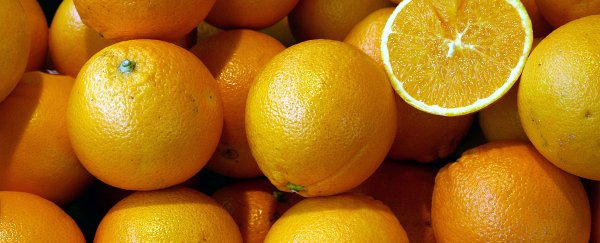Vitamin C, or ascorbate, is an important mineral that helps our bodies to grow and develop normally. It's also essential for preventing undesirable health conditions such as iron deficiency, anaemia or scurvy.
Just like humans and other animals, plants have to continually regulate the level of vitamin C inside their cells to stay healthy.
But unlike humans, plants have the ability to produce large amounts of vitamin C, seemingly on command, depending on certain environmental conditions. For instance, prolonged exposure to sunlight or drought might cause certain plants to produce an abundance of vitamin C over that period, which is used to help stave off disease.
Until now it was unclear what biological mechanism allowed plants to so quickly regulate all this extra vitamin C produced in stressful conditions. But now, scientists from the Queensland University of Technology (QUT) in Australia think they have unravelled the mystery.
They have shown that high ascorbate concentrations in cells can cause unexpected transformations of RNA molecules, which are responsible for regulating genes inside cells, into proteins. This transformation, which the authors say is "especially uncommon in plants", represses a critical enzyme that under normal conditions interacts with ascorbate to produce Vitamin C. This is then redistributed throughout the plants' cells. Under stressful conditions, however, it allows the ascorbate concentrations to remain high in the cells of the leaf.
"We discovered it's not whether the cell is making the RNA but whether the RNA is converted into a protein that is the deciding mechanism," said biologist Roger Hellens from the Centre for Tropical Crops and Biocommodities in QUT's Institute of Future Environments in a press release. "It's very interesting because we found it was the level of vitamin C itself in each cell that decides whether RNA turns into the protein which makes vitamin C."
The team says this finding could help horticulturalists breed more resilient, vitamin C-rich plants, as well as fruits and vegetables that could improve vitamin C intake in human diets.
"Vitamin C is important in our diet because it enables more iron, which carries oxygen to our cells, to be taken up and absorbed," said biologist Roger Hellens from QUT's Institute of Future Environments in the release.
As most food is relatively low in vitamin C, the team says there is an opportunity to improve human health by developing plant varieties with higher levels of ascorbate. The team began by looking at leafy plants.
Depending on the environmental conditions, each cell in the leaf assesses whether it should produce more ascorbate. This helps the plant by absorbing energy from sunlight and preventing a damaging oxidative process that could cause dehydration, Hellens explains in the QUT press release. "In vitamin C regulation it is the ascorbate molecules which interact with a critical enzyme in the biochemical pathways to make vitamin C. Plants can move the level of ascorbic acid between cells as needed."
The researchers say the next stage of the research is to begin looking directly at fruits and vegetables to understand why their concentrations of vitamin C are so high.
The team has published its findings in the journal Plant Cell.
Love science? Find out more about the world-leading research happening at QUT.
